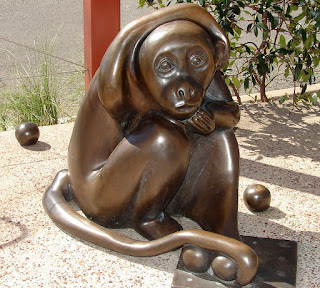e.g. “It is on a brass monkeys Tuesday morning that my friend and I get the train into West Yorkshire with three things on our mind – shopping, food and drink.”
“Well it was caused by something called a ‘sudden stratospheric warming’ – which might seem surprising, given how brass monkeys it is outside.”
This originates from a longer phrase, “it’s cold enough to freeze the balls off a brass monkey”.
It is claimed that this has a nautical origin.
“The guns on 18th-century men-of-war ships needed gunpowder to fire them, and this was stored in a different part of the ship for safety reasons. Young boys, usually orphans, who were small enough to slip through tight spaces, carried this powder along tiny passages and galleys. Because of their agility the lads became known as ‘powder monkeys’ and by association the brass trays used to hold the cannonballs became known as the brass monkeys. These trays had 16 cannonball-sized indentations that would form the base of a cannonball pyramid. Brass was used because the balls would not stick to or rust on brass as they did with iron, but the drawback was that brass contracts much faster in cold weather than iron. This meant that on severely cold days the indentations holding the lower level of cannonballs would contract, spilling the pyramid over the deck, hence ‘cold enough to freeze the balls off a brass monkey’.” [1]
However, another text casts doubt on this explanation, suggesting that the phrase merely alludes to metal figures becoming brittle in cold weather [2].
According to the Collins English Dictionary, “brass monkeys” is now rarely used and is in the lower 50% of commonly used words, so you might want to avoid it if appearing “cool” is important to you. 😉
Brass Monkey is also the name of a folk band formed in 1981, which combined traditional folk and brass instruments [3].
[1] Jack, Albert. Red Herrings & White Elephants: The Origins of the Phrases We Use Every Day (pp. 12–13). Kindle Edition.
[2] “brass” in The Oxford Dictionary of Phrase and Fable, edited by Knowles, Elizabeth. Oxford University Press, 2005.
[3] “Brass Monkey” in Encyclopedia of Popular Music, edited by Larkin, Colin. Oxford University Press, 2006.
Photo credit: David Jefferies

No comments:
Post a Comment